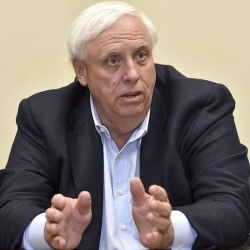
West Virginia Governor Jim Justice says a sports betting integrity fee was struck, but few others attending backed him up.
Gov. Jim Justice of West Virginia claims he has a deal on West Virginia sports betting regulations which includes an integrity fee for sports leagues. West Virginia lawmakers and gaming advocates say they have no clue what the governor is talking about.
State Delegate Shawn Fluharty (D-Ohio) said he will seek an injunction against any sports betting law the Justice administration tries to implement, because Gov. Justice’s announcement is also an admission that he violated West Virginia law.
Fluharty said, “I see his press release as an admission by the governor that a violation of the open meetings law took place yesterday. I’m very much considering filing an action in Kanawha Circuit Court, shedding light on this.”
Racing Advocate Claims “No Deal” in Place
Meanwhile, John Cavacini, who represents the West Virginia Gaming and Racing Association, expressed astonishment that the governor would make such a proclamation. John Cavacini was at the meeting where Gov. Justice says a decision was made. The racing association representative said no such deal was made.
The meeting included state officials, gaming industry executives and advocates, and representatives of the major US sports leagues. Though integrity fees were discussed, no consensus could be formed, said the racing advocate.
John Cavacini said, “I don’t know how in the world we got to the point where the governor says there is a deal. There is no deal in place.”
“Nothing and a Lot Happened”
The state lottery meeting’s minutes were posted on the “Sports Handle” website, which gave a conflicted or even confusing view of what happened at the key meeting Gov. Jim Justice touted. The blog posted stated, “Nothing and a lot happened,” which confused some members of the West Virginia media.
The blog posted read, “A lot, because first-hand accounts of this closed-door meeting paint a colorful picture between attendees that include state lawmakers, a lobbyist for the NBA and NFL [Larry Puccio] who has ties to Governor Jim Justice; an appearance by the NHL, possibly the first time the league has gotten involved on sports wagering publicly; representatives from West Virginia University and Marshall, plus casino representatives and a ‘citizen volunteer’ [Bray Cary] for West Virginia Governor Jim Justice, who did not attend in person but spoke by speakerphone.”
The Sports Handle blog post continued, “There was also some reported shouting, ‘shuttle diplomacy,’ and an apparent conflict of interest in play.”
Bookmakers/Sports Leagues Data Sharing
John Cavacini said the day-long meeting specifically turned down the idea of an integrity fee for sports leagues. Instead, those on hand agreed to have West Virginia’s sports betting firms to enter into contracts with the leagues to buy data from the leagues which is needed for bookmaking. The sportsbooks otherwise would have to buy the data from a third-party, so it made sense for WV bookmakers and sports leagues to make an arrangement.
Cavacini said West Virginia gaming groups understood the leagues wanted to make money from expanded sports betting, but the gaming industry was adamant that an integrity fee not be part of that moneymaking. Cavacini added, “We’re trying to get the leagues some money, but we’re not going to pay the integrity fee.”
“Dangerously Close” to Integrity Fees
Lottery Commission Director Alan Larrick split the difference between the two sides. Larrick said that integrity fees were discussed, but no agrement was made. The Lottery Commission’s head said of the gambling laws being discussed, “The fee being discussed was one-quarter percent. There’s no agreement in place, but I think we’re getting dangerously close. I do think there’s an agreement in principal. Is there a final, written agreement? No.”
Alan Larrick’s statement is closer to John Cavacini’s account than it is to Gov. Justice’s. Cavacini and Larrick both said integrity fees were part of the discussion, but no agreement had been reached. According to Larrick, though, the deal was close enough to completion that Gov. Jim Justice might feel justified in announcing the terms of such a deal. Political opponents might attack ulterior motives to the announcement, other than confusion. Justice’s announcement could be construed as a way to set the terms of the deal through public relations, by announcing a foregone conclusion.
If so, then Shawn Fluharty is ready to call the governor’s bluff. West Virginia’s “open meetings law” requires public officials to share with the public all pivotal deliberations. Back-room deals are not made, but instead aired to the public, so they can be consulted and informed of what their representatives are doing. The open meetings law is a common anti-corruption policy.
